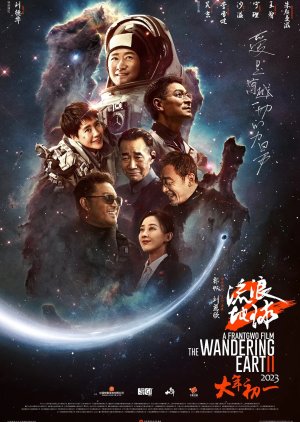A decent alternative to typical western disaster movie.
A nice prequel with a rather slow act on the drama side but it definitely works after the universe build up. Not your typical western disaster movie where the heroes usually focused on a white group with one or two expendable minorities here and there, rather you get a grand set but you are most looking at the iminent disaster from the chinese point of view.Effects is on marvel's level but i pretty much think marvel already stuck on first avenger movie level for how many years now?
Music (not song) is grand and I don't know chinese movie actually spend that much time on music.
Was this review helpful to you?

A Bigger, Bolder Leap for Chinese Sci-Fi
When The Wandering Earth (2019) burst onto the scene as one of China's first major sci-fi blockbusters, it established itself as a landmark moment for Chinese cinema. Adapted from Liu Cixin’s short story of the same name, it took creative liberties to expand the premise into a full-fledged disaster epic. Now, The Wandering Earth 2 (2023) takes things a step further—not just as a prequel that deepens the world-building but as a film that refines and elevates the themes that made the first movie so impactful.There is no doubt that The Wandering Earth 2 was made for the cinematic experience. Watching it in a theater is a must to truly appreciate its scale - I think my opinion of the film would’ve been different had I not watched it on a big screen first. The jaw-dropping VFX and booming sound effects (especially with the space elevator scene) amplified its impact in a way that simply cannot be matched by a home viewing.
When I first watched The Wandering Earth in Australian cinemas, the entire theatre was empty aside from my cohort. This time around, the entire theatre was packed, even with COVID restrictions still in place, even during the midnight screening when most people would prefer to be asleep. This giant contrast speaks to the immense cultural and cinematic impact the sequel has had, drawing larger audiences and cementing itself as a must-watch experience.
Unlike the first film, which had a more straightforward “save the Earth” disaster-movie plot, The Wandering Earth 2 delves deeper into the political and philosophical dilemmas of humanity’s response to planetary catastrophe. It explores the decision-making behind the “Moving Earth Project,” showing the desperate struggle between factions advocating for different survival strategies—whether to escape Earth entirely or to embark on the long and arduous journey of pushing it out of the solar system. This level of depth adds significant weight to the story, making it feel grander in both scale and stakes.
One of the film’s strengths is its ability to balance spectacle with heartfelt human drama. It touches on loss, sacrifice, and the persistence of hope, making it more than just a visual extravaganza. Wu Jing’s performance as Liu Peiqiang—who would later become an important figure in the first film—adds emotional depth, showing the cost of duty and responsibility in the face of global calamity.
A key element that sets The Wandering Earth 2 apart from Hollywood sci-fi is its emphasis on collective unity over individual heroism. While Western sci-fi films often focus on lone protagonists defying authority, this film underscores the idea that survival is a communal effort. This deeply ingrained collectivist philosophy—one that resonates strongly in Chinese culture—might not be immediately familiar to Western audiences, but it is precisely this perspective that gives The Wandering Earth series its distinctive edge.
This theme is also reinforced through the portrayal of international collaboration. While there are geopolitical tensions in the story, the narrative ultimately leans towards cooperation, reflecting an idealized vision of global unity in the face of existential threats.
For those familiar with Liu Cixin’s works, The Wandering Earth 2 contains several nods to his broader literary universe. The concept of artificial intelligence playing a major role in decision-making recalls elements from The Three-Body Problem, where AI and virtual reality shape humanity’s response to existential crises. Additionally, the film references real-life space projects, drawing inspiration from China’s advancements in space technology, such as the Tiangong space station and the Long March rockets.
The space elevator, a concept long discussed in theoretical physics and sci-fi literature, is one of the film’s most visually striking elements. While similar concepts have appeared in Western media (such as Arthur C. Clarke’s The Fountains of Paradise), The Wandering Earth 2 brings it to life in a way that feels both realistic and grounded in near-future science. The sequence involving its catastrophic collapse serves as a metaphor for humanity’s fragile grasp on technological ambition.
Another historical parallel can be drawn between the film’s depiction of global-scale engineering projects and China’s own history of massive infrastructural undertakings, such as the Three Gorges Dam and the South-North Water Diversion Project. These real-world projects share the same spirit of large-scale planning and collective effort seen in the film’s planetary migration project.
Final Thoughts
The Wandering Earth 2 surpasses its predecessor by adding layers of complexity, political intrigue, and character-driven drama to its already spectacular visual presentation. The prequel format allows it to expand on the universe in meaningful ways, making it more than just a disaster film—it becomes an observation on the choices humanity makes when facing the abyss. While the first film succeeded in its high-stakes action and grand premise, the second film excels in its worldbuilding and thematic richness.
For those who haven’t seen it yet, watching it on the biggest screen possible is highly recommended. The impact of its visuals, especially the space elevator sequence, is something that home viewing simply cannot replicate. The film's uniquely Chinese perspective on unity and survival gives it a refreshing take in the sci-fi genre, making it a standout among its peers.
Overall, The Wandering Earth 2 is a triumph—not just for Chinese cinema but for global sci-fi storytelling as a whole.
Was this review helpful to you?

An Unnecessary Prequel
Wandering Earth 2 does not pick up at the end of the first movie or even some time later. Instead, it opts to go a couple decades earlier before the lead character of WE2, Liu Pei Qiang, met the mother of the lead character of WE, Liu Qi. WE2 shows us what happened on Earth prior to movie 1 and how the plan to move the planet was initiated and accomplished. The problem with that is that I don't think anyone was really asking.The story drags, especially around Andy Lau's character, Tu Heng Yu, who perfects the A.I. program. The end of WE2 connects us to the beginning of the first movie and to a comment made by Pei Qiang toward the end of WE. It gave 2001: A Space Odyssey vibes. The movie has excellent graphics. Honestly, my favorite parts of the movie came from the suppporting and guest roles. The Chinese excel at making side conversations interesting (or funny) as opposed to mummbles when you know people are speaking you just don't know what they're saying as with most movies. It's an anime trope that works very well in a scifi movie where there is a lot of action and movements going on simultaneously.
The cast is good. There are little scenes that stand out and gestures by some actors. Li Xue Jian plays a politician and his facial expressions and small gestures gave life to every scene he was in. There's a scene where he is just clapping, but the way he claps & his facial expression speaks volumes. That's an actor! When you can command a scene and get your point across without opening your mouth. You're a master. Kawawa Kadichi plays South African astronaut, Herbert Copley, who goes through training with Liu and has a running gag of Pei Qiang not understanding him. Another character (either his name is Chief Wang or I have 2 characters mixed up) was great. The scenes between the Chief and Liu were touching. Wu Jing as Liu Pei Qiang and Andy Lau as Tu Heng Yu were good. Nothing really stellar to write about except for Yu's creep factor. He was a creepy grieving scientist on the verge of maybe becoming the quintessential mad scientist.
The music partly made the music. It set the tone and provided suspense in scenes that wouldn't have had any otherwise. Re-watch is low, but I can see myself re-watching scenes.
Over all, it's entertaining... enough. It's not a movie that I would tell people they had to see even if they saw the first one. If I heard someone saying they were going to watch the WE series, I'd advise them to watch chronologically and watch 2 before 1, especially since 2 is more story driven while 1 is almost non-stop action.
Was this review helpful to you?

Une cascade d'adrénaline où l'émotion n'a pas été oubliée.
C'était avec une certaine impatience que j'attendais la suite de cette saga, bien que le 1 n'est pas été dans mes coups de coeur de ces dernières années. Et il faut l'avouer, c'est un sacré bond en avant! Un film de science fiction mêlant habilement de la science fiction à un thème qui se fait plus rare, celui de "catastrophe".Je vais le dire de suite, j'ai tout simplement adoré.
La réalisation est époustouflante et n'a rien à rougir face à des blockbusters américains ou coréens. Les effets spéciaux nous immergent réellement dans ce monde futuriste, avec un graphique classique mais maîtrisés. Les couleurs loin d'être froides (ce que je reproche souvent à la science fiction) jonglent entre le métal propre à ce thème et des couleurs plus chaudes comme les scènes avec Yaya, ce qui permet d'éviter l'overdose de sensation de quelque chose d'impersonnel.
Les scènes d'actions sont excellentes, la première scène d'attaque est grandiose, où tout part dans tous les sens mais sans pour autant avoir une sensation de brouillon désorganisée. C'est rapide, fulgurant et l'intensité de l'urgence se fait sentir tout au long du film avec une intensité grandissante.
Le scénario est intéressant et bien que n'étant pas fan de science fiction, j'ai pris un grand plaisir à suivre, voire à comprendre, les tenants de cette histoire. C'est prenant et je n'ai pas décroché une seule fois.
Au-delà de cette histoire de sauver le monde face à une catastrophe qui apparaît comme inéluctable, c'est avant tout une histoire d'être humain. La dimension de l'Humanité est donc transcendé au maximum! Le message, que j'ai trouvé sublime, ici n'est pas de savoir qui sauvera le monde, mais tout simplement de faire de son mieux, de son sacrifice, et surtout de le faire TOUS ensemble!
C'est remarquable. Il faut saluer l'initiative de l'auteur et du réalisateur de nous montrer un monde où chaque pays travaillent main dans la main. Exit les rivalités, les préjugés, les agressivités et arrogances des pays. Ici, tous sont concernés par cette catastrophe et tous s'écoutent et s'alignent ensemble. Ne serait-ce que ce détail où chacun parle librement sa propre langue, traduit directement par une oreillette, est un détail qui a son importance. C'est un délice que d'entendre conjointement du chinois, de l'anglais, du russe, du français, du coréen, du japonais etc....
Le souffle épique du film apporte une émotion qui m'a bien arraché plusieurs larmes. Une des dernières scènes, celle où le choix des sacrifiés doit être fait m'a fait vibrer, et c'est le coeur en miettes que nous voyons "les escadrons des pays" faire le choix de laisser la jeune génération porter le flambeau de la continuité, du combat futur. C'est une scène forte, car, personne ne cherche à passer l'un devant l'autre ou à s'attribuer une gloire éphémère, c'est une scène qui permet de comprendre cette force de l'Homme, celle de se dépasser, celle de s'écouter et d'agir avec humilité. J'ai juste adoré.....
Un fait rarissime à souligner. Il n'y AUCUN méchant, antagoniste à baffer ou à haïr, agissant stupidement ou égoïstement contre les protagonistes. Ici, chacun à un devoir à remplir, une responsabilités sur les épaules et , chacun porte sa croix sans jamais se plaindre.
C'est donc un film grandiose par le message véhiculé, par des scènes d'actions trépidantes et intenses, par une multitude palettes d'émotions. Je ne sais si un 3 est programmé, mais je ne dirai pas non à une conclusion de cette histoire....
Was this review helpful to you?








































